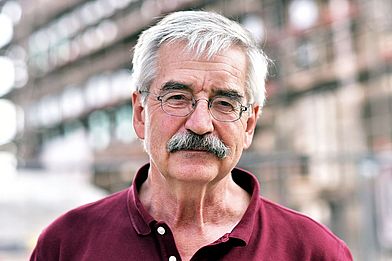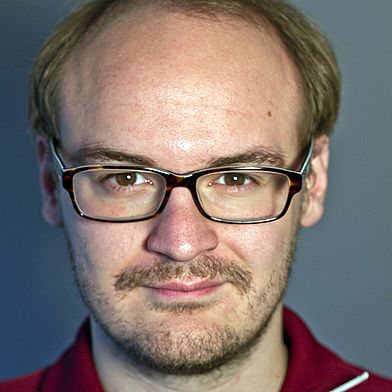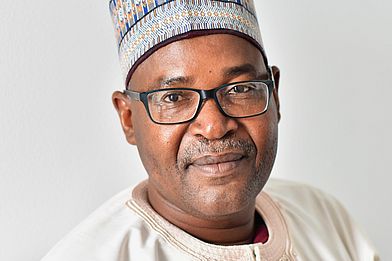Speakers
The (Re)Construction of the World | Aid. Solidarity. Politics. | February 12-14, 2021

Barbara Adams is Chair of the Board of Global Policy Forum. She was trained as an economist in the UK, worked as Executive Director of the Manitoba Council for International Affairs in Canada and has undertaken development programming in Uruguay. From 2003–2008 she worked for the United Nations Development Fund for Women (UNIFEM). Her experience has included serving as a member of the President of UN General Assembly CSO taskforce for MDG 2010 Summit and the Civil Society Reflection Group on Global Development Perspectives, which has released its report, No future without justice, in the Development Dialogue series. Barbara Adams has authored and co-authored many articles, reports, commissioned studies and books on the UN and multilateral issues.

Yvonne Adhiambo Owuor is a Kenyan writer. Her short stories have been published in numerous international literary journals, including McSweeney's and Chimurenga Chronic. In 2003, Yvonne Adhiambo Owuor won the prestigious British Caine Prize for African Writing. Her debut novel 'Dust' (2013) was shortlisted for the Folio Prize, and she also received the Jomo Kenyatta Prize for Literature, Kenya's most prestigious literary award, for it. 'The Dragonfly Seas' is her second novel. Yvonne Adhiambo Owuor lives in Nairobi.

Saeed Al-Batal is a Syrian filmmaker living in exile in Berlin. During the Syrian civil war, he was in Douma, Eastern Ghouta, and together with Ghiath Ayoub documented the everyday life of the people with a film camera between 2011 and 2015. Together they created a 120-minute documentary from over 500 hours of camera footage, which they were able to smuggle out of the country. "Still Recording" premiered at the Venice Film Festival in 2018, where it won the FIPRESCI Critics' Prize. It is a unique document and testimony of civilian resistance to the violence and terror of the state.

Nixon Boumba is a Haitian human rights activist and member of the Kolektif Jistis Min nan Ayiti (Haiti Mining Justice Collective). Boumba has been working in mining-affected areas of Haiti to ensure that local people understand their rights in regard to the extractives industry. Besides his work on mining, Boumba is also a supporter of economic and cultural rights in Haiti, a staunch advocate on behalf of all marginalized and oppressed populations in Haiti, and a leading figure calling for vigilance and justice in Haiti’s current development climate, which is marked by notoriously low wages and controversial efforts to create industrial and tourist zones. Boumba also works on issues of gender and sexuality in the context of humanitarian aid.

Susan Buck-Morss is Distinguished Professor of Political Philosophy at the CUNY Graduate Center, NYC, where she is a core faculty member of the Committee on Globalization and Social Change. She is Professor Emeritus in the Government Department of Cornell University, Ithaca, NY. Her training is in Continental Theory, specifically, German Critical Philosophy and the Frankfurt School. Her work crosses disciplines, including Art History, Architecture, Comparative Literature, Cultural Studies, German Studies, Philosophy, History, and Visual Culture. She is currently writing on the philosophy of history: History as the Cosmology of Modernity.

Pierina Ferretti is a Chilean sociologist who focuses on the production of subjectivity under neoliberalism. She is a member of the Nodo XXI Foundation, which is a forum for an anti-neoliberal, feminist and democratic left and organizes public discussions and trainings for members of social movements for this purpose. Ferretti is also a member of CLACSO's Working Group on the Legacy and Perspectives of Latin American Marxism and part of the Latin American Working Group on the work of Peruvian Marxist José Carlos Mariátegui. She regularly publishes essays and analyses on current political issues in national and international media.

Thomas Gebauer is spokesman for the medico Foundation. From 1996 to 2018, he served as Executive Director of medico international. He joined medico as a community service worker in the late 1970s. His work focuses on issues of international peace and security policy and the social conditions of global health. In 2014, the psychologist received the Goethe Plaque, with which the city of Frankfurt honors personalities of cultural life. In 1991, he co-founded the "International Campaign to Ban Landmines," which was later awarded the Nobel Peace Prize. More from Thomas Gebauer

Sabine Hark is one of the most renowned gender researchers in Germany and is considered a co-founder of Queer Theory in Germany. The sociologist teaches as a professor at the TU Berlin and has headed the Center for Interdisciplinary Women's and Gender Studies (ZiFG) there since 2009. In recent years, she has focused primarily on the nexus between identity, difference, and solidarity. Most recently, in 2017, she published the essay "Unterscheiden und herrschen" (" Distinguish and Rule") together with Paula-Irene Villa on contemporary entanglements of racism, sexism, and feminism.

Ulrike Herrmann is a journalist and works as a business correspondent for the daily newspaper "taz". She is a trained banker, studied history and philosophy, and was subsequently a research assistant at the Körber Foundation and press spokeswoman for Hamburg's Senator for Equal Opportunities Krista Sager. Ulrike Herrmann describes herself as "a typical middle-class child" from a suburb of Hamburg "where all the inhabitants believed in social uplift." She has published numerous books on economic policy. In 2016, she published her book, "No Capitalism Is No Solution Either. The crisis of today's economy - or what we can learn from Smith, Marx and Keynes".

Mark Heywood is a South African human rights activist focusing on the right to health. He served as secretary general of the Treatment Action Campaign, which advocates for free and open access to AIDS medicines, and until 2019 chaired SECTION 27, a nongovernmental organization that uses public relations campaigns and legal tools to fight for the right to health and education. Since then, he has served as co-editor of the new civil society section in South Africa's most widely read online newspaper, the Daily Maverick, Maverick Citizen. He also conducts research on activism and strategies for asserting socioeconomic rights and aligning economic policy with the realization of those rights. More from Mark Heywood

In 2007, Wolfgang Kaleck founded the European Center for Constitutional and Human Rights (ECCHR) in Berlin together with internationally active lawyers. Since then, he has been its Secretary General and Legal Director. Prior to that, the lawyer had been working as a criminal defense attorney since 1991. Since 1998, he has also worked in the Coalition Against Impunity to ensure that those responsible for the murder and so-called disappearances of Germans during the Argentine military dictatorship are held accountable. He has received numerous awards for his work. Most recently, Kaleck received the Bassiouni Justice Award from the Centre for International Law Research and Policy in 2019.

Katja Maurer is a journalist and editor-in-chief of the medico newsletter. A trained interpreter and translator, she headed the public relations department of medico international for many years. In her journalistic work, she regularly deals with political developments in Latin America. She regularly publishes on Israel-Palestine and on the topic of multi-perspective memory. Since the 2010 earthquake in Haiti, she has written on the country's history and present, and co-authored with Andrea Pollmeier the book "Haitian Renaissance. The Long Struggle for Postcolonial Emancipation" (2020). More from Katja Maurer

Achille Mbembe is a Cameroonian philosopher, political theorist and public intellectual. After holding positions at various U.S. universities, he now teaches at the University of the Witwatersrand in Johannesburg. Mbembe was awarded the 36th Geschwister Scholl Prize in 2015 for his book Critique of Black Reason (2013). He is one of the most important living authors when it comes to the aftermath of colonialism. He coined the term "necropolitics" to describe the proliferation of power and sovereignty structures whose features include the production of death on a large scale. His most recent publication is "Out of the Dark Night. Essays on Decolonization" (2020). More from Achille Mbembe

Sandro Mezzadra teaches theory of politics at the University of Bologna and is Adjunct Fellow at the Institute for Culture and Society, University of Western Sydney. He is an active participant in the 'post-operaist' debate and one of the founders of the Euronomade project (www.euronomade.info). Over the past decade he has worked extensively on migration, postcolonial critique and global capitalism. Together with Brett Neilson, he published the book Border as Method, or, the Multiplication of Labor (2013). His most recent publication is "The Politics of Operations. Excavating Contemporary Capitalism" (2019). As an activist, he participates with the Mediterranea Saving Humans campaign. More from Sandro Mezzadra

Rodrigo Mundaca is a Chilean human rights activist. An agricultural engineer by training, he is the national spokesman for the "Movement for the Defense of Access to Water, the Earth and Environmental Protection" (MODATIMA), which fights for free access to water. In addition to his involvement, he works for a consulting company that advises smaller farmers and helps them develop skills in organic production. Fighting for access to water as a human right, Mundaca has made powerful enemies in politics and business and lives under constant threat. In 2019, he was awarded the Human Rights Prize of the City of Nuremberg.

Maximilian Pichl studied law and political science at the Goethe University Frankfurt am Main. He then worked as a legal policy adviser for the human rights organization PRO ASYL e.V. His research focuses on critical legal theory, refugee and migration law, and police law. He is currently researching the constitutional reappraisal of the murder series of the "National Socialist Underground" (NSU) and the institutional changes in EU migration policy since the "Summer of Migration 2015". He is a member of the editorial board of the journal Forum Recht and the Grundrechte-Report, as well as an active member of the Network for migration law.

Milo Rau is a director, writer and, since 2018, artistic director of NTGent (Belgium). Critics call him the "most influential" (Die Zeit), the "most awarded" (Le Soir), the "most interesting" (De Standaard), the "most controversial" (La Repubblica), the "most scandalous" (New York Times) or "most ambitious" (The Guardian) artist of our time. Since 2002 he has published over 50 plays, films, books and actions. His theater productions have been shown at all major international festivals and toured in over 30 countries worldwide. His latest film, "The New Evangelium" (2020), will be shown digitally as part of the conference.

Disha A Ravi is an activist from Fridays For Future, India. Her motivation to join climate activism came from seeing her grandparents who are farmers, struggle with the effects of the climate crisis. Her activism is aimed at enabling equity to those most impacted.

Jason Rosario Braganza is a Kenyan Economist with over ten years experience working on international development in Africa. Over the past decade, Jason has focused his work on trade and regional integration; finance for development and tax; illicit financial flows and domestic resource mobilisation as well as poverty and inequality. As a distinguished expert on tax justice he has worked for and with various African NGO’s and networks. Since October 2020 Jason serves as Executive Director of African Forum and Network on Debt and Development (AFRODAD). He lives in Nairobi.

Jennifer del Rosario-Malonzo is a development worker, writer, editor and social activist, working with civil society, people’s organizations and networks for over two decades now. She is the Executive Director of IBON International, a Southern international non-government organization that engages in capacity development for people’s rights and democracy around the world. She is also a former Global Coordinator of the Reality of Aid Network. She has been working extensively on issues of development finance, particularly development cooperation including South-South Cooperation, debt, and sustainable development financing, using the lens of a human rights-based approach to development.

Thomas Rudhof-Seibert is a philosopher, author and political activist. He works as a human rights officer at medico international and is also responsible for Southeast Asia. There he oversees, among other things, the campaigns against the exploitative practices of the international textile industry. He is also coordinator of the human rights network Sri Lanka Advocacy and vice-chair of the Scientific Advisory Board of the Rosa Luxemburg Foundation. In his reflections, he interrogates the revolutionary potential of the idea of human rights from different angles. In 2017, he published the book "On the Ecology of Existence - Freedom, Equality, Environment." More from Thomas Rudhof-Seibert

Miriam Saage-Maaß is a lawyer and Deputy Legal Director of the European Center for Constitutional and Human Rights (ECCHR), where she established and has headed the Business and Human Rights Unit for several years. Among other things, she has worked on cases against companies such as KiK on the exploitation of workers* in South Asia. She writes regularly on the issue of corporate legal responsibility for human rights violations in global supply chains and is an internationally recognized expert. In October 2016, Miriam Saage-Maaß and ECCHR Secretary General Wolfgang Kaleck were awarded the Hans Litten Prize of the Association of Democratic Lawyers (VDJ).

Mark Schuller is one of the international experts on Haiti who has also studied and pointed out the negative effects of humanitarian aid for years. Schuller is Chair of Anthropology and Nonprofit and NGO Studies at Northern Illinois University in Chicago and is a Fellow in the Department of Anthropology at the University of Haiti. His research on the deepening of dependency through humanitarian aid in the aftermath of the Haiti earthquake disaster has been widely noted and received beyond scholarly circles. Schuller's latest book is titled “Humanity's Last Stand: Confronting Global Catastrophe” (2021).

Rita Laura Segato taught and researched from Brasília for over 30 years and is an excellent scholar of all of Latin America, especially that of the majorities still too often ignored: Women, indigenous people, afrolatin@s. An anthropologist emeritus, she is particularly known for her research on gender issues in indigenous and Latin American communities, as well as for her research on violence against women and the relationship between gender, racism and coloniality. Her publications include "La guerra contra las mujeres" (2016; The War Against Women) and "la critica de la colonialidad en ocho ensayos" (2015; Critique of Coloniality in Eight Essays). She is one of the most important feminist intellectuals in Latin America.

Moussa Tchangari is secretary general of the Alternative Espaces Citoyens association, one of the most important civil society organizations in Niger. In 1991, Moussa Tchangari was one of the founders of the Association Nigérienne des Droits de l'Homme (ANDDH). He is also active as a journalist. In recent years, the long-time medico partner has been campaigning for the rights of migrants who pass through Niger as a transit country in the direction of Europe. Human rights activists in Niger are persecuted by the government. Last March, Tchangari and five other activists were arrested after a government-critical demonstration and spent several weeks in prison.

Vanessa Eileen Thompson is a research assistant at the Comparative Cultural and Social Anthropology Department of European University Viadrina Frankfurt (Oder). Her research and teaching interests include critical racism and migration studies, Black Studies, and intersectional inequality and gender studies. With a PhD in sociology, she is currently working on a research project on racial profiling and its gendered dimensions. Thompson combines academic and activist approaches to the analysis and critique of racist police violence and the resistance of those affected by it.

Shirin Tinnesand is currently enlisted at the Oslo Metropolitan University in Norway, researching the role of international aid organisations in refugee camps and crisis areas. She is of Norwegian and Kurdish descent, and has been a fellow at the universities of India, Nepal, Argentina, Vietnam and then completed extensive field research in Ghana. Since the beginning of 2020 she consulted the Greek organisation Stand By Me Lesvos with public relations and has assisted various refugee self-organisations in capacity building. Recently she published various articles on the scenery of Moria Refugee Camp.

Nina Treu is co-founder of Konzeptwerk Neue Ökonomie in Leipzig, where she has been working on the topics of post-growth, climate justice and socio-ecological transformation since 2011. Together with others, she works on the development of positive social designs and utopias, most recently in the project "Zukunft für alle" ("Future for All"). Therefore, she co-edited the book "Future for All - A Vision for 2048" and organized a major congress in 2020 with medico, among others. Her goal is to make post-growth policies understandable, accessible and appealing to many, while showing how they can be achieved together.

Eva von Redecker is a philosopher and publicist. From 2009 to 2019 she was a research associate at Humboldt University in Berlin, and in 2015 she taught for a semester as a visiting lecturer at the New School for Social Research in New York. At the end of 2020, she took up a Marie Skłodowska Curie Fellowship at the University of Verona in Italy. Eva von Redecker grew up on an organic farm, where she learned a lot about strawberry cultivation, direct marketing and horse breeding. Today, she lives in the countryside again. She is currently working on a research project on authoritarian character. Her most recent publication was "Revolution for Life. Philosophy of the New Forms of Protest" (2020).

Jean Ziegler is one of the icons of the anti-globalization movement. A sociologist by training, he taught in Geneva and at the Sorbonne in Paris, was a member of the Swiss Parliament until 1999, and was UN Special Rapporteur on the Right to Food from 2000 to 2008. He was also a member of the Advisory Committee of the Human Rights Council and sits on the advisory board of the NGO Business Crime Control. Ziegler coined the phrase "Every person who dies of hunger today is murdered," and his publications such as "Switzerland Washes Whiter" have sparked broad controversy. Most recently, he published "The Shame of Europe. Of Refugees and Human Rights" (2020).


